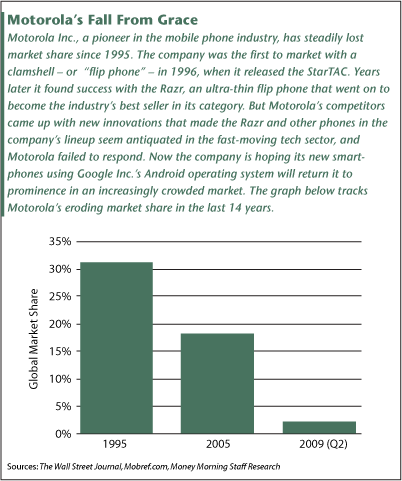Motorola Inc. (NYSE: MOT) last Thursday charmed investors when it revealed its Cliq smartphone, which will compete head on with Apple Inc.'s (Nasdaq: AAPL) iPhone and Research in Motion Ltd.'s Blackberry.
Motorola's stock is up nearly 12% since the announcement, as investors are hoping the new phone will be enough to win back some of the company's lost market share.
However, saving Motorola's mobile division - which the company plans to spin off - is a daunting task. The company - which invented the cell phone, as well as a plethora of other communication devices used by police and military - has seen its global market share of wireless phones fall to 2% in its second quarter this year from 31% in 1995. Mobile phone sales accounted for 33% of Motorola's second-quarter revenue, down from 41% a year ago.

Motorola had enjoyed some success in 2004 when it released its popular Razr clamshell-style phone, which was viewed as a fashionable and useful high-tech gadget. During its four-year run, more than 110 million Razrs were sold.
However, Motorola failed to respond to innovation in the mobile phone market that was pioneered by its fiercest competitors. Apple and RIMM have whittled away at Motorola's market share over the past five years.
With the Cliq, Motorola is trying to separate from the competition by angling its device toward a younger, less professional base. The Cliq's biggest draw will be its quick access to social networking content from Facebook Inc., Twitter Inc. and News Corp.'s (NYSE: NWS) MySpace.
"Our initial take is favorable, and it seems that Motorola is carving out a niche in the crowded smartphone market by focusing on socially minded demographics as opposed to enterprise users or pro-sumers," RBC Capital Markets Corp. analyst Mark Sue told Reuters. Sue upped his share target for Motorola from $8 to $10 a share.
Aside from that distinction, the Cliq includes features typically found in most any smartphone: A touch screen, slide-out keyboard, and access to an application store. It runs on Google Inc.'s (Nasdaq: GOOG) Android mobile operating system, already found on two other T-Mobile Phones.
However, if Motorola's Android-based phones are going to take off, they'll need bigger wireless carriers. The phones currently function on Deutsche Telecom AG's (NYSE ADR: DT) T-Mobile USA Inc. network. But with just 34 million users, T-Mobile is the fourth-largest carrier in the United States.
For that reason, a second Android phone will be offered for Verizon Communications Inc.'s (NYSE: VZ) mobile network, which is nearly three times as large. Verizon Wireless has about 88 million subscribers and is the largest carrier in the United States.
Wall Street may be underestimating the boost in profit Motorola will get from its smartphone line in 2010, UBS AG (NYSE: UBS) analyst Maynard Um said in a note to investors. Um has upgraded the communications firm's stock to "buy" from "neutral." Um attributed the upgrade to the expected holiday release of the Cliq, as well as additional deals with mobile carriers in the fourth quarter.
Pricing for the Cliq was not announced, but Um anticipates recession-friendly pricing.
"We do not expect new competitor handset announcements to have a materially negative sentiment impact on Motorola, as the company is not defending share, likely only has share upside, and is likely to be an aggressor on price," he wrote.
A sizeable boost in profit could come from the Android phones' access to the Android Market, Google's application store. Apple's App Store for its iPhone and iPod Touch devices have proven to be a boon for the company, with more than 1.8 billion paid and free apps downloaded since its debut in July 2008. While many of the apps, such as those from The New York Times are free, they present consumers a strong value proposition when buying a smartphone.
However, Apple's App Store has more than 75,000 applications available, while Google's Android Market offers just 10,000 apps.
Motorola will add more Android-based phones next year, Chief Executive Officer Sanjay Jha said at a conference last week in San Francisco, and Avian Securities LLC analyst Matt Thornton expects Android phones to represent 30% of the total handsets it sells in 2010, Bloomberg News reported.
"It's the first step in a long journey," said Jha, who insists the Cliq will not make or break his company.
In March 2008, Motorola to split its core business from its mobile division after pressure from billionaire investor Carl Ichan mounted. At the time, analysts said the split would put the company in a better position to sell assets or negotiate a joint venture.
A week later, Videocon Industries Ltd., the largest electronics maker in India, said it was interested in buying Motorola's mobile business. However, neither a sale nor split of Motorola has happened.
Motorola shares closed at $8.79 in trading yesterday (Monday), up 11 cents or 1.27%.
News and Related Story Links:
- Wikipedia:
Motorola Razr - Wikipedia:
Really Simple Syndication - Reuters:
Motorola Shares Jump On Hopes for Google Phone - Bloomberg News:
Verizon Said to Be Second Carrier for Motorola's Second Android Phone - Associated Press:
Motorola Shares Rise On Possible Smartphone Boost - Barron's:
Motorola: UBS Upgrades to Buy - The New York Times:
iPhone Application - Investopedia:
Value Proposition - The Wall Street Journal:
Motorola Bets on Google-Powered Phones - Money Morning:
Videocon Signals Interest in Buying Motorola Phone Unit


